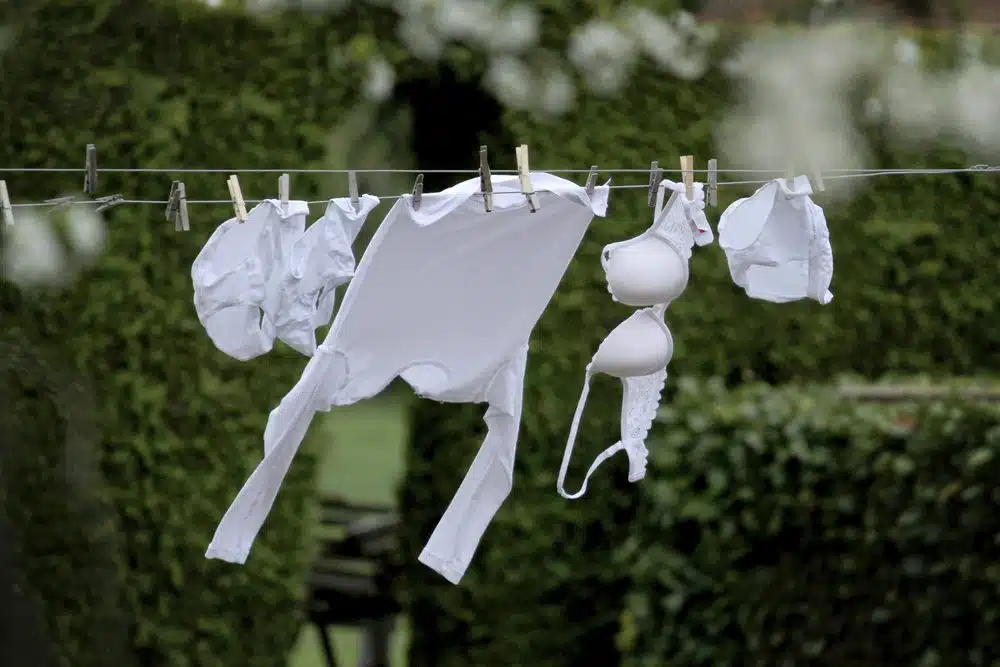Part II: Clothing Care
Last week we discussed how organizing isn’t just about how you arrange your home – it’s really about how you make your choices. But once you have filled your closet with carefully chosen, versatile pieces, it is essential to know how to care for them in a way that protects the structure of the cut and fabric. Clothes that are cared for well look better and last longer. You will shop less and save more.
There are just a few simple rules to follow.
1. Avoid dry cleaning
2. Wash your clothes as infrequently as you can.
3. Never use a dryer.
In other words, treat every item you own like a delicate.
I know, guys. This seems impossible. Living in New York means that even in the best circumstances, we probably don’t have a backyard in which our finery can hang on a clothesline and be blown dry by soft breezes. But if you find a system that works for you, and stick to a schedule, gentle-washing all of your clothes is totally possible. I anything, I find it easier – not to mention cheaper. So bear with me, and I’ll explain how it works.
DRY CLEANING: An Unnecessary Evil
As many of you may know, dry cleaning is downright bad for the environment (and your skin), plus, it’s toxic chemicals can degrade the fibers of your clothes. Clothing is labeled “dry clean only” to avoid the buyer throwing a silk shirt in with her towels, and drying it on high heat. Heat of any kind as well as vigorous agitation of a washing machine will undoubtedly ruin any delicate shirt. But aside from certain materials or complicated cuts like business suits, it is likely you can hand wash many items at home in your sink or delicate wash in your machine, if you do it right.
I don’t have a lot of patience for sink washing en masse. It’s prohibitively difficult and messy to roll up sopping wet shirts in a towel and press it dry, and I’m always worried they will stretch out and lose shape. So unless something is very delicate or embellished, I do the following:
1. Sort all tops and delicate bottoms by color and place them in separate delicates bags. This includes cotton t-shirts, button downs, silk shirts, bras, undies, undershirts, sweaters – you name it. These bags are incredible. They let water pass through while the clothing stays folded in the bag. No over agitation, no stretching, no catching on the machine and tearing. PLUS, the bags keep your clothes safe during the spin dry, which is an essential step to leeching as much water out before you air dry.
2. Wash like colors on COLD using a MILD detergent. I use Delicates Wash from The Laundress for everything, even my jeans.
3. Hang or lay flat to dry (more on this later).
FREQUENCY:
Wet washing is only one way to clean clothing. We asked our sustainability expert Delfina how she takes care of her clothes, and she emphasized taking down the frequency of washings just as much as the method. Clothing that is frequently exposed to water and soaps will degrade faster, so be careful about how often you throw it in your hamper. Instead, consider:
1. Purchasing a Delicates spray to spritz your bras and undershirts after you wear them. Delicates Spray from the Laundress gently lifts odors and oils from sweat and leaves your clothes smelling fresh. (No, we are not paid to advertise for them, we just think they are an amazing brand.)
2. When you come home for the day, take off your silk shirts or button downs and hang them up – spray them with a wrinkle release spray. You can even hang them in the bathroom so they can be steamed out by your nightly shower.
3. If you’re a messy eater (like me) spot clean your jeans, shirts, and sweaters when you get home, spray with delicates spray, and them fold them away for the night.
4. Invest in a handheld steamer – a quick steam to a wrinkled waistline or elbow creases will refresh your worn clothes in 5 minutes!
NO HEAT DRYING
Heat will destroy delicate or shrinkable fabrics; it will loosen stitching and degrade hems. Consistent drying will make soft fabrics pill and harden, or ruin others entirely. The trick is to avoid it entirely. Delicate washing and hang drying seems more time consuming, but it’s not. Whereas I would have to spend another 45 minutes waiting for my clothes to dry in the machine, I just pile my spun delicates bags full of damp clothing back into my laundry basket and take them back to my apartment. I set up a folding dryer rack in my office and hang every piece, except for particularly heavy shirts, silks, or sweaters, which I lay flat to dry. On particularly humid days, I might set up my fan in there to increase circulation, but otherwise I just leave it alone for 12 hours.
The next morning, I take my coffee in my home office and fold away my clothes. I like this system because it means that laundry isn’t an hours-long saga. You know when you dry a load of clothes and then get distracted before folding, only to come back to a basket full of clean but wrinkled items? This system is easy to split up – I can do it in pieces over a day or so, and leave to finish other projects in the meantime.
A NOTE ON SHEETS AND TOWELS:
If anyone has ever made the mistake of trying to hang dry a towel in a small space, you will already know this. Towels are thick and take days to dry – they are more likely to grow bacteria and get that mildew smell, which is difficult to get out. I wash my sheets and towels on hot and dry them in the machine. They touch my body every day and I like the idea that they get disinfected once in a while. I still use a gentle cleanser, as commercial detergents and dryer sheets will leave a chemical film on top of the material in order to “soften” it, which is not good for your skin or the durability of the fabric.
The Benefits
I know we’ve said it a dozen times already, but hand-caring for your clothes will ultimately save them from premature retirement. Plus, you can save money on dry cleaning bills, and decrease your carbon footprint by saving on the astronomical electricity it takes to heat a dryer. Ultimately, you can buy fewer things and keep them for longer, which is ultimately a wonderful thing for your wallet and less waste for your community.
Featured Photo by TheCrimsonMonkey/iStock / Getty Images

















